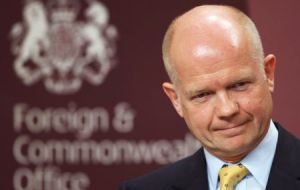MercoPress. South Atlantic News Agency
Foreign Office stretched “almost to the limit”, warns Parliament: “a more realistic approach needed”
 Foreign Secretary Hague is implementing a challenging spending cut program at a time of international turbulence
Foreign Secretary Hague is implementing a challenging spending cut program at a time of international turbulence The Foreign Office is being stretched “almost to the limit” as it attempts to cut spending at a time of international turbulence while having to cope with additional demands such as the London Olympics, MPs have said.
The Foreign Affairs Select Committee called for William Hague and his department to adopt a “more realistic approach” to what could be achieved given the cuts imposed in the 2010 spending review.
The MPs also raised concern about the future funding of the BBC World Service and strongly opposed plans for its wider commercialization.
In its review of the FCO’s performance and finances in 2012/13, the committee was told a planned 10% cut in the number of UK-based staff at the FCO would not be met by the original target of 2015, but will instead require an extra year.
The MPs heard the FCO was on course to make savings totaling approximately £170 million over the Spending Review period to 2014/15 but warned of the effect on the department.
The committee’s report said: “There are signs that the FCO is being stretched, almost to the limit. One of the symptoms is the prospect that the department will need an extra year to meet its target of a 10% headcount reduction in UK-based staff, largely because of ‘sustained pressure to deliver an ambitious policy agenda’.
“We believe the department may be in danger of trying to do too much at a time when capacity is being limited. A more realistic approach by the department and by ministers is needed, as well as a clearer definition of priorities.”
The MPs said that “on top of the day-to-day business of sustaining a foreign policy at a time of particular turbulence in the Middle East and elsewhere”, the FCO had also had to meet the demands of the 2012 Olympic and Paralympic Games, the expansion of the network of diplomatic outposts and an increased emphasis on commercial work.
“We conclude that in future the department will need to attach greater importance to living within its means and will need to recognise that there are limits to what it can take on,” the MPs said.
Tory Sir Richard Ottaway, the committee’s chairman, said: “We’re sounding a warning. We have no problem with an active and ambitious foreign policy. But we’re getting a distinct impression that the FCO may be trying to do too much when capacity is limited by a tough spending review settlement.
“It’s actually had to increase staff in order to cope with policy demands, and it’s not on track to meet its target of a 10% headcount reduction in UK-based staff by 2015. What we’re saying is: be realistic, live within your means, and make sure that priorities are clearly defined.”
From April this year the BBC World Service will cease to be funded by the FCO and will instead be paid for through the licence fee. The committee welcomed the BBC’s commitment to increase the World Service’s funding by more than £5 million to £245 million from April, but called for funding levels for future years to be announced.
“We strongly welcome the increased funds which the BBC will make available to the BBC World Service in 2014/15 but, given the BBC’s argument that licence fee funding offers greater financial security and scope for long-term planning, we are surprised that the BBC has announced figures only for 2014/15.
“We urge the BBC to announce funding levels for the BBC World Service for the remainder of the current BBC charter period and at least to maintain in real terms the 2014/15 funding levels.”
The MPs opposed ideas for the future of the World Service set out in a letter to crossbench peer Lord Alton by the BBC’s director of global news Peter Horrocks.
“We strongly oppose the proposals currently under consideration by the BBC Trust for a wider commercialization of the World Service,” the report said. The MPs were also concerned that the protection for the World Service’s interests within the corporation’s governance structure “is not as strong as is being claimed, and the picture appears to us to be one of steady erosion of World Service influence within the BBC”.
The committee recommended that the World Service should be represented on the BBC executive board and that the director of BBC global news should be a member of the management board.




Top Comments
Disclaimer & comment rules-

-

-

Read all commentsCan anyone tell me in when in the last 100 years there was no International turbulence??
Jan 14th, 2014 - 01:35 am 0Oh gosh ! The poms are broke !!
1 Klingon
Jan 14th, 2014 - 07:14 am 0“Can anyone tell me in when in the last 100 years there was no International turbulence??”
18th March 1987. It was a Wednesday, I remember it well. Great day.....great day.
@1
Jan 14th, 2014 - 08:23 am 0It has become part of the political culture, nothing is safe in the public sector from saving and cuts, unless its MP's salaries.
Commenting for this story is now closed.
If you have a Facebook account, become a fan and comment on our Facebook Page!